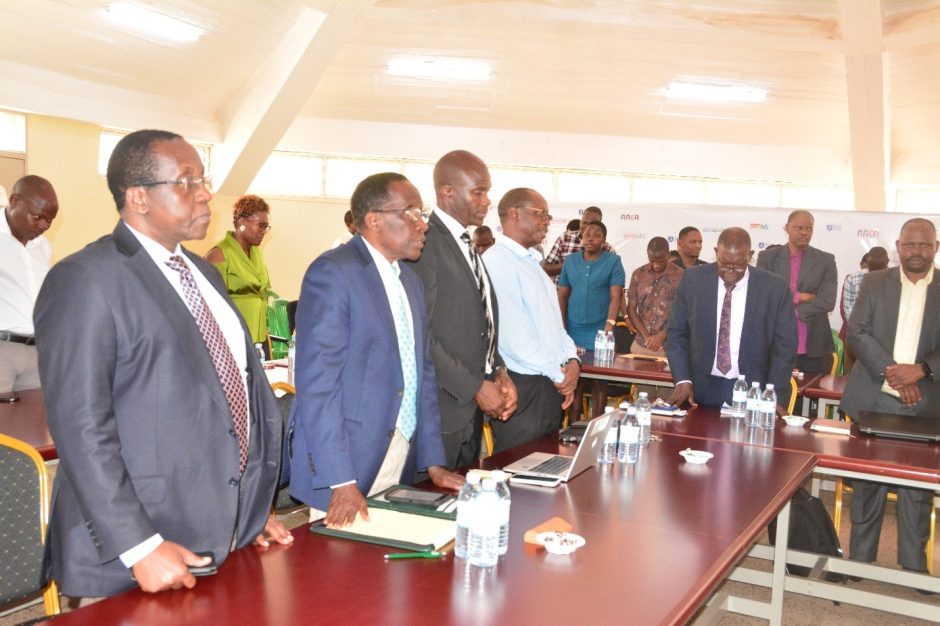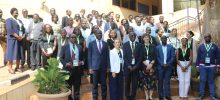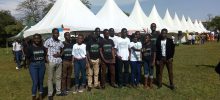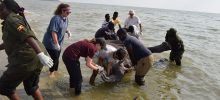CIMTRADZ Founders Convention Reflects on Achievements and Sets a Bold Agenda for Global Biosecurity
The Consortium for Integrated Management of Transboundary Diseases and Zoonoses (CIMTRADZ) Founders Convention held at CoVAB on Friday September 12th 2025.
In a strategic gathering at Makerere University’s College of Veterinary Medicine, Animal Resources and Biosecurity (CoVAB) Makerere University, the Consortium for Integrated Management of Transboundary Diseases and Zoonoses (CIMTRADZ) held its Founder’s Convention to reflect on its 12-year journey and unveil its ambitious next chapter: the Multisectoral Alliance for Global Biosecurity and Bioeconomy Advancement (MAGBBA).
The event, hosted under the School of Biosecurity, Biotechnical and Biomolecular Sciences (SBLS), brought together scientists, students, and strategic partners from across Uganda and beyond. The convention served as both a retrospective and a launchpad, celebrating CIMTRADZ’s achievements while setting a bold agenda for MAGBBA’s future.

Ms. Brenda Nakazibwe, Team Lead for the Pathogen Economy at the Science, Technology and Innovation (STI) Secretariat
Ms. Brenda Nakazibwe, Team Lead for the Pathogen Economy at the Science, Technology and Innovation (STI) Secretariat, delivered an address on behalf of Hon. Dr. Monica Musenero, Minister of Science, Technology, and Innovation. She commended the brains and effort behind CIMTRADZ for their relentless efforts in implementing research and training programs initially supported under the Presidential Initiative on Science and Technology that set the pace for the numerous achievements realised todate.
Nakazibwe outlined Uganda’s strategic roadmap for harnessing science and innovation to drive national development. She revealed that since March 2022, the STI Secretariat has operated through eight specialized bureaus focused on mobility, export promotion, and productivity acceleration. “Our mandate is to coordinate the ecosystem,” Nakazibwe emphasized, “bringing together academia, media, and the private sector to ensure science leads us to another level.”
While emphasisng the commitment of continued support to the academia in finding solutions to societal challenges, Nakazibwe also spotlighted Uganda’s prioritized industrial value chains, which include ICT, artificial intelligence, infrastructure innovation, aeronautics, and space science. She stressed that science must be a tool to combat poverty and unemployment, aligning with the goals of National Development Plan III.

Makerere University’s Vice Chancellor Prof. Barnabas Nawangwe, was represented by Prof. Mukadasi Buyinza
Representing Vice Chancellor Prof. Barnabas Nawangwe, Prof. Mukadasi Buyinza praised the university’s growing network of research centers, some of which have attained Level 5 status as centers of excellence. He emphasized that the transition from the Consortium for Integrated Management of Transboundary Diseases and Zoonoses (CIMTRADZ) to the proposed Multisectoral Alliance for Global Biosecurity and Bioeconomy Advancement (MAGBBA) signals a strategic shift toward sustainability and broader impact.
“In the face of pandemics and epidemics, the world is counting on scientists,” Prof. Buyinza said. “This is no longer a concern confined to laboratories, but it’s a matter of national survival.”
He called on Uganda’s scientific community to develop a comprehensive national inventory of pathogens, stressing that biosecurity must be a shared responsibility across sectors. He also commended the movement of Makerere’s academic talent into government and private agencies, describing it as a positive extension of the university’s influence.
“We are in the Fourth Industrial Revolution,” he noted, urging researchers to harness their expertise to address pressing health and development challenges. “Collaboration and cooperation are no longer optional but are essential.”
Prof. Buyinza concluded by pledging institutional support for scientific initiatives that translate into tangible products and services, reinforcing Makerere’s role as a driver of innovation and societal transformation.

Prof. Kabasa emphasized the urgent need to protect both human and animal populations from emerging pathogens.
During the convention Prof. John David Kabasa delivered a powerful message on the future of biosecurity and bioeconomy, calling on scientists to take the lead in safeguarding society against biological threats. Prof. Kabasa emphasized the urgent need to protect both human and animal populations from emerging pathogens. He described biosecurity and bioeconomy as critical pillars for national resilience and global competitiveness.
“We are living in an era of insufficiency,” Prof. Kabasa stated, “where bio threats are no longer distant possibilities but immediate challenges demanding coordinated action.”
He commended Makerere University for its visionary leadership and the platform it has provided to advance scientific research and innovation. He also acknowledged the Government of Uganda for its substantial investments across institutions, which he said have laid the foundation for transformative progress.
Prof. Kabasa stressed the importance of capacity building and value amplification, and called on universities and schools to equip learners with skills that enhance the value of biological assets and foster entrepreneurial thinking.
Prof. Kabasa however, he expressed concern over the persistence of outdated ideologies, weak innovation culture, and limited Pan-African collaboration. To address these gaps, he advocated for a culture of collaboration across higher education, research, and service delivery.
“Scientists hold the key to societal transformation,” he said, urging them to embrace their responsibility and develop solutions to pressing challenges.

Prof. M. Kaneene of Michigan State University one of the founder mentors
Prof. M. Kaneene of Michigan State University delivered an inspiring presentation that underscored Uganda’s growing role in global biosecurity and infectious disease preparedness. Speaking as one of the founding mentors of the Consortium for Integrated Management of Transboundary Diseases and Zoonoses (CIMTRADZ), Prof. Kaneene reflected on the initiative’s journey and its far-reaching impact. He highlighted a Special Issue of a scientific journal featuring four foundational papers that helped catalyze new projects not only in Uganda but across Africa and beyond. “Centers like CEBIGH give CoVAB a unique niche in addressing regional and global biosecurity challenges,” Prof. Kaneene said, emphasizing the importance of research and training in tackling emerging and reemerging infectious diseases.
He urged stakeholders to build on past achievements and expand the center’s influence through targeted programs such as short courses and summer training initiatives. With Uganda poised to take a leadership role, he stressed that biosecurity must remain a national priority.
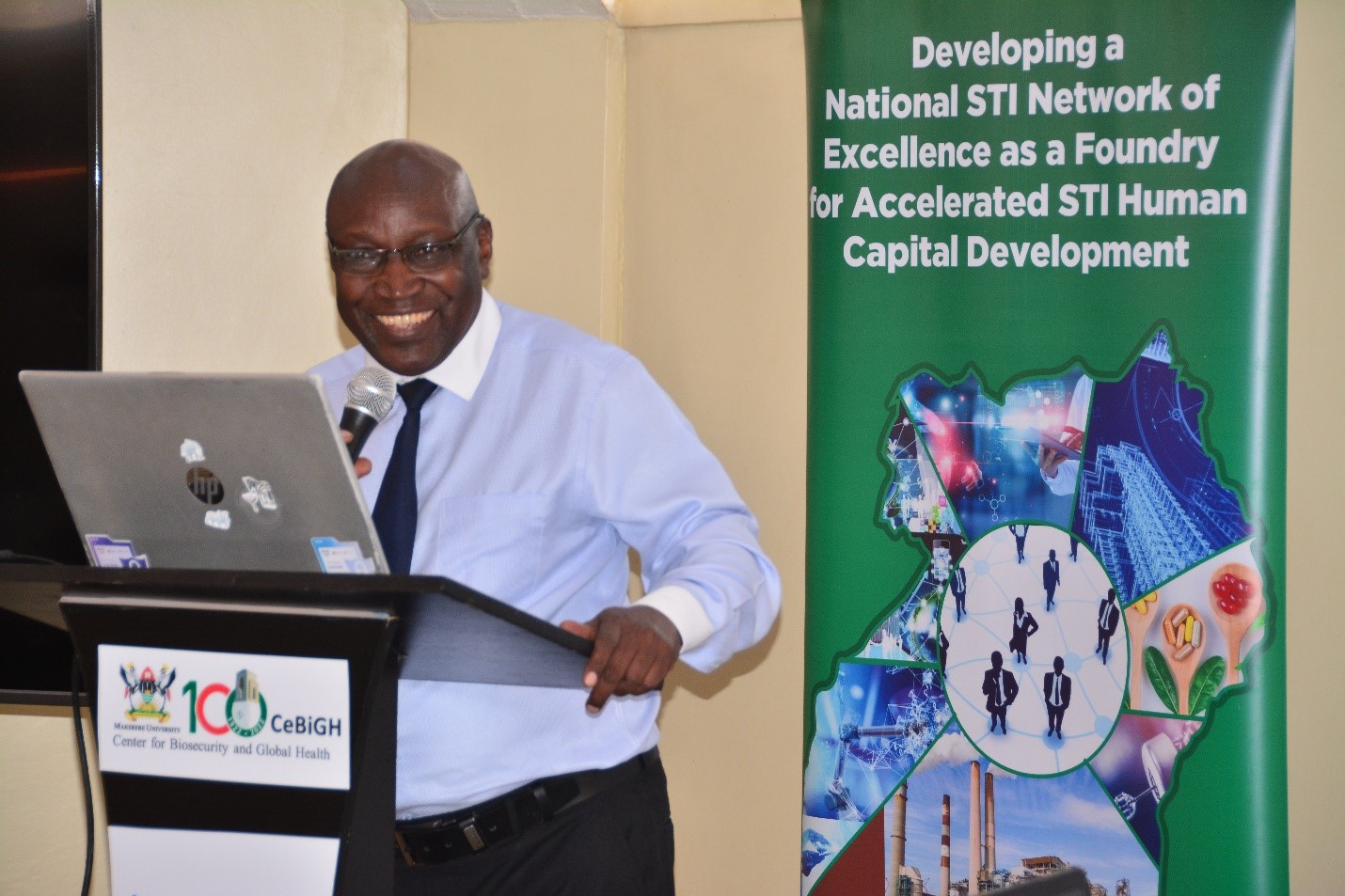
Prof. Savino Biryomumaisho represented the CoVAB Principal and welcomed the participants
The Principal of the College of Veterinary Medicine, Animal Resources and Biosecurity (CoVAB), Prof. Frank Norbert Mwiine, represented by Prof. Savino Biryomumaisho reflected on the consortium’s decade-long impact. He noted that CIMTRADZ had significantly contributed to the expansion of the former Faculty of Veterinary Medicine, particularly under the School of Biosecurity, Biotechnology, and Laboratory Sciences.
“CIMTRADZ has been instrumental in shaping our infrastructure and academic programs,” Prof. Mwiine said. He highlighted key developments including the central laboratory, animal research facility, biomarker and diagnostic facility, and the Centre for Biosecurity and Global Health. He also pointed to the launch of advanced degree programs,Master’s and PhDs,that have created new opportunities for staff and students to pursue higher education and research excellence.
“These achievements align perfectly with Makerere University’s vision of being a thought leader in knowledge generation for societal transformation,” he added. Prof. Mwiine cited vaccine development as one of the tangible outcomes of the consortium’s work and expressed optimism about the next phase of the initiative, which transitions into the Multisectoral Alliance for Global Biosecurity and Bioeconomy Advancement (MAGBBA).
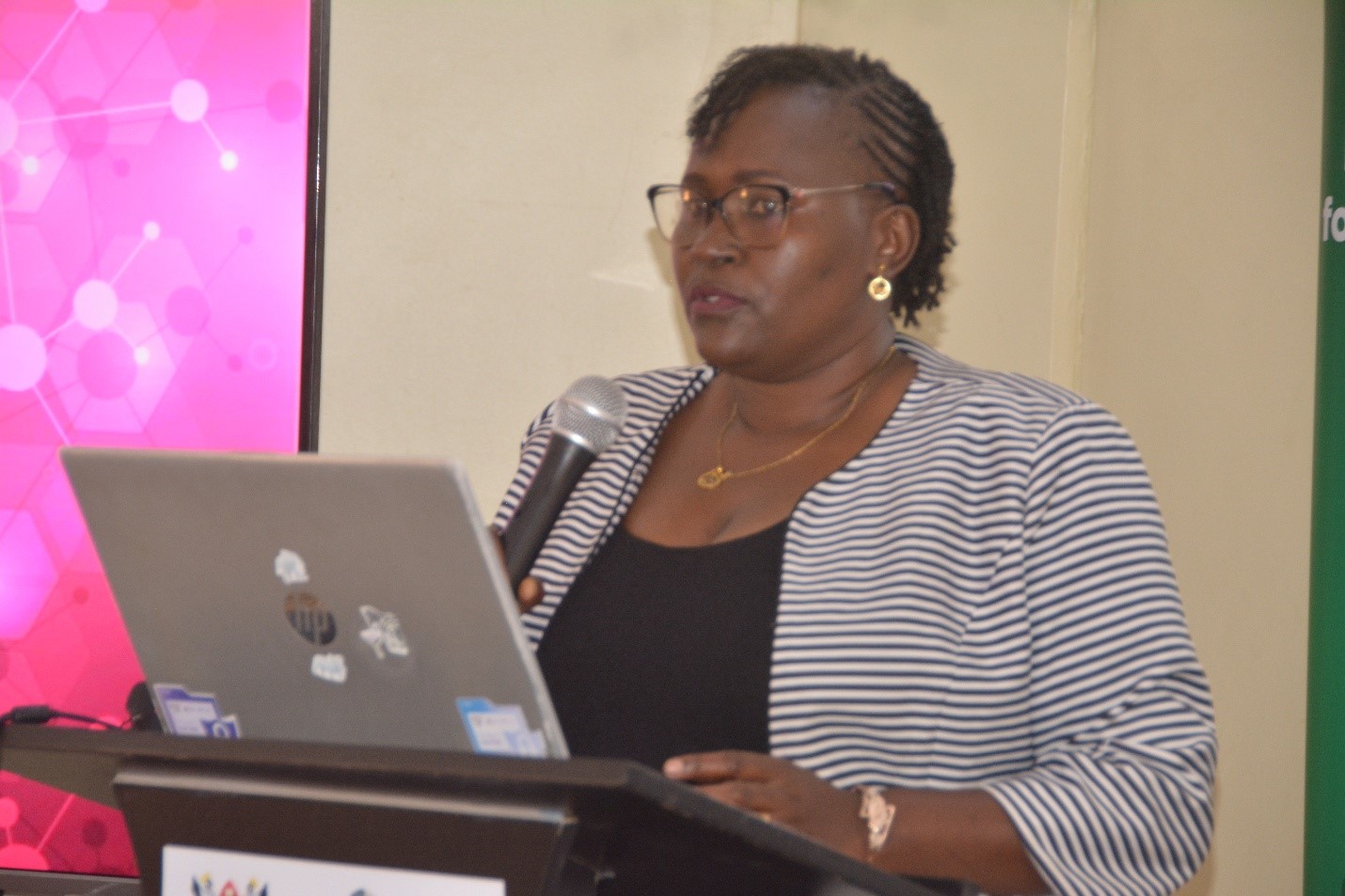
Dr. Claire Mack Mugasa, Dean of the School of Biotechnical and Laboratory Sciences (SBLS)
Dr. Claire Mack Mugasa, Dean of the School of Biotechnical and Laboratory Sciences (SBLS), presented an overview of the school’s mandate in biosecurity, biosafety, and biomedical sciences. “Our laboratories are not just teaching spaces, they are hubs of innovation shared across departments, schools, and colleges,” Dr. Mugasa said. She emphasized the importance of partnerships with sister universities in Uganda and abroad, noting that collaboration is key to building capacity and driving scientific progress.
Following her remarks, Dr. Enoch Matovu, Director of the Centre for Global Health, addressed the urgent need for preparedness in the face of emerging and re-emerging diseases. He cited the 2022 chickenpox outbreak as a wake-up call for the region’s health systems.
“The establishment of this research centre was a strategic response to such threats,” Dr. Matovu said. “Through programs like vaccinology, we are equipping scientists to protect both human and livestock ecosystems.”
He praised the founding team behind the Centre for Biosecurity and Global Health for their vision and dedication, which have propelled CoVAB to the forefront of regional biosecurity efforts.

A Section of the attendees that reflected on the achievements
During the CIMTRADZ Founder’s Convention at Makerere University, participants celebrated a decade of achievements in biosecurity and institutional development at CoVAB. Key milestones included the establishment of a state-of-the-art research center, enhanced international collaborations, staff capacity building, and the launch of advanced academic programs. The event also highlighted cultural and academic exchanges such as summer schools, workshops, and conferences. These accomplishments reflect CoVAB’s strategic growth and its evolving role as a regional leader in biosecurity, now transitioning into the next phase under MAGBBA.
Story by Harriet Musinguzi


